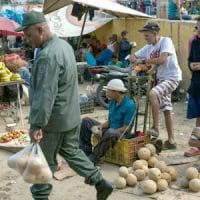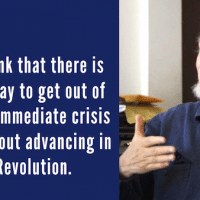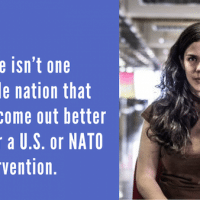-
U.S. media ignore—and applaud—economic war on Venezuela
The U.S. media chorus supporting a U.S. overthrow of the Venezuelan government has for years pointed to the country’s economic crisis as a justification for regime change, while whitewashing the ways in which the U.S. has strangled the Venezuelan economy (FAIR.org, 3/22/18). Sister Eugenia Russian, president of Fundalatin, a Venezuelan human rights NGO that was […]
-
Either Washington or Venezuela, savage capitalism or socialism
Luis Britto Garcia is perhaps Venezuela’s most highly regarded public intellectual. A firm supporter of the Bolivarian Process, he has written numerous plays, novels, historical investigations and film scripts and is also an incisive commentator on politics in the region.
-
President Nicolás Maduro’s message to the American people
I am Nicolás Maduro, constitutional president of the Bolivarian Republic of Venezuela, and I want to send a message to the American people to alert them to the media, communication and psychological warfare campaign that is developing in the international media and, above all, in the U.S. media against Venezuela.
-
Donald Trump’s war of recolonization against Venezuela
It is our duty to stop this war of recolonization, writes Samuel Moncada. Venezuela remains firm and in peace; nobody can isolate and divide us. – Trump
-
Signatures against Intervention Threats Collected in Venezuela
On Wednesday, Venezuelans will demand the end of the interventionist pretentions of the government of the United States at the beginning of a nationwide signature-collecting campaign called by President Nicolas Maduro.
-
Why it could (but shouldn’t) be the end of the arms control era
President Ronald Reagan and Soviet General Secretary Gorbachev signing the INF Treaty in the East Room of the White House on December 8, 1987. Credit: Ronald Reagan Presidential Library.
-
Facebook’s Troll Hunter in Chief Nathaniel Gleicher tied to Neocon think tank
While Facebook claims impartiality in its crackdown on “coordinated inauthentic behavior,” the loyalties of the man charged with carrying out that mission. if his resume is any indication, are not with the users.
-
Twitter erupts after 2,000 Pro-Venezuelan accounts are deleted
A total of 1,196 social media accounts based in Venezuela have been closed accused of “influencing domestic audiences.”
-
U.S. withdrawal from INF Treaty marks a dangerous move towards nuclear escalation
The U.S. has cited Russian violations of the treaty as the reason for their withdrawal. This is despite Russia offering to open up its weapons systems for U.S. inspection. The treaty requires a six-month notice period following which the country no longer has to abide by the treaty.
-
Internal U.S. Gov’t document outlines program of ‘economic warfare’ on Venezuela
An internal government document reveals tactics of “economic warfare” and “financial weapons” the U.S. is using against Venezuela in the name of “furthering capitalism.”
-
Canada Labour Congress with 3M members, denounces Trudeau’s support for intervention in Venezuela
The CLC vehemently rejects a militarized solution to this crisis; the people of Latin America have not forgotten the brutal history of military rule in the region.
-
Foxconn: playing fast and loose in Wisconsin
When state and local governments bid for corporate investment, working people lose. It is as simple as that. And Foxconn’s on-again, off-again, and on-again shrinking investment in Wisconsin is a case in point.
-
Everyday life in besieged Venezuela
A young author presents intimate snapshots of ordinary life as it is lived by millions of Venezuelans during a grueling crisis fueled by deadly U.S. sanctions and coup efforts.
-
Trump abandons INF treaty
Watch our video to find out about the latest decision. Trump has announced that he will withdraw the U.S. from the INF treaty. This treaty has been a bedrock of nuclear arms control, having eliminated thousands of deadly nuclear missiles in Europe. This is a very dangerous moment for the whole world. A new nuclear arms race is […]
-
Peculiarities of U.S. imperialism in Latin America
Venezuela, the current target of U.S., President Donald Trump, is a case illustrating the ‘peculiarities’ of imperialist politics. We will proceed to outline the background, techniques and impact of the imperial power grab.
-
Russia denounces U.S. cynicism sanctioning Venezuelan PDVSA
Russia denounced Tuesday the U.S. cynicism by announcing sanctions against the Venezuelan oil company PDVSA and excluding from that sanction U.S. companies operating in the South American nation.
-
The making of Juan Guaido
Juan Guaidó is the product of a decade-long project overseen by Washington’s elite regime change trainers. While posing as a champion of democracy, he has spent years at the forefront of a violent campaign of destabilization.
-
The U.S. coup in Venezuela: new attempt to eradicate the Chavista Revolution
For over two years we have been told Putin’s Russia has interfered with the 2016 U.S. presidential elections. We now find the U.S. government has decided it can unilaterally invalidate the actual presidential elections in Venezuela and recognize a person of its choosing as president.
-
Maduro denounces Citgo takeover as ‘robbery’
Venezuelan president Nicolas Maduro says he plans to take legal action against the United States to defy the sanctions.
-
AGO proposes nationwide raids on books containing ’banned ideas’
Attorney General Muhammad Prasetyo is proposing that massive raids be carried out to hunt down books which contain communist teachings and banned ideologies. The proposal was made after the seizure of hundreds of books around the country allegedly containing “banned ideas”. — Taufiq Siddiq, Jakarta “I’m proposing that if possible, yes massive raids be carried […]




















